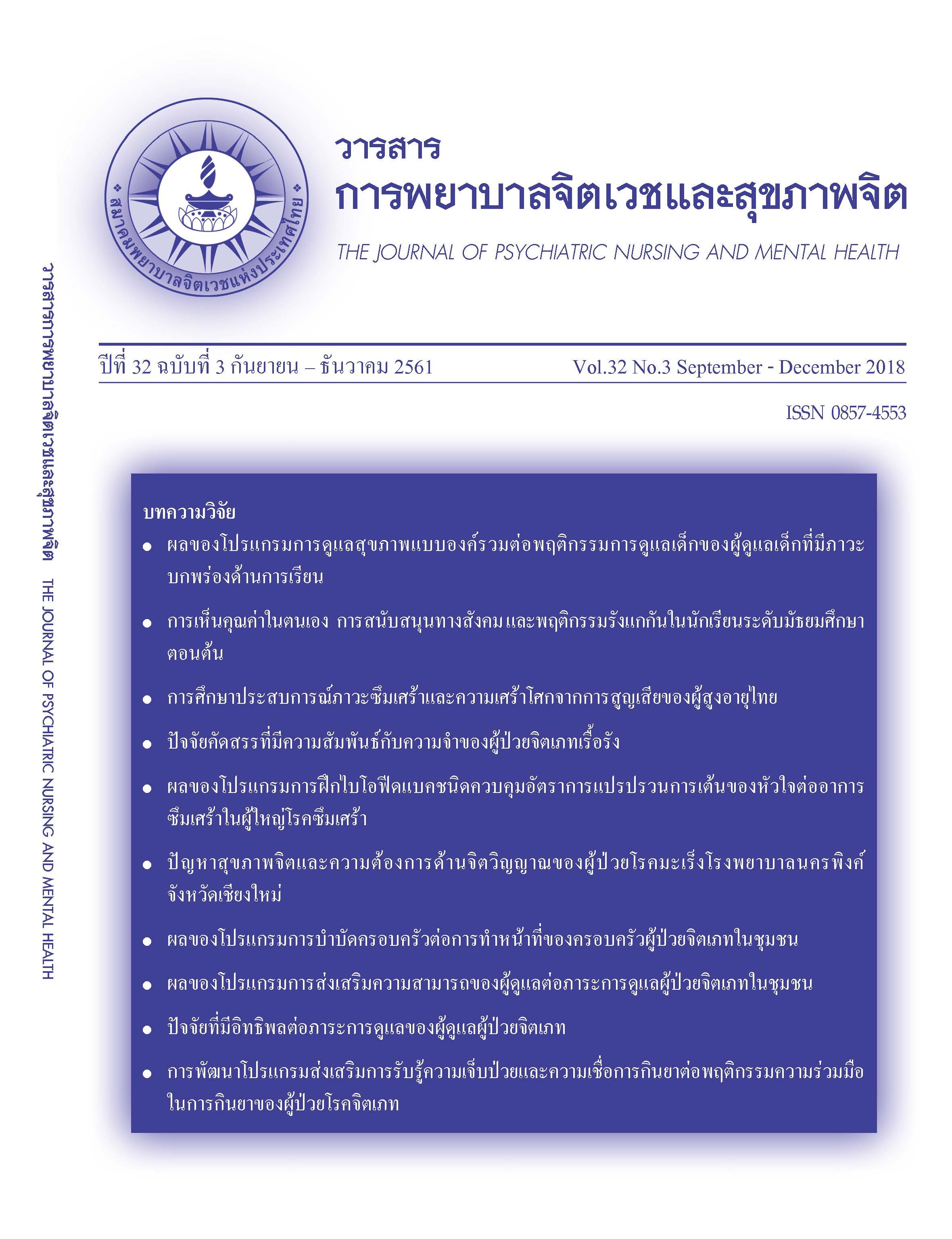การพัฒนาโปรแกรมส่งเสริมการรับรู้ความเจ็บป่วยและความเชื่อการกินยาต่อพฤติกรรมความร่วมมือในการกินยาของผู้ป่วยโรคจิตเภท
Main Article Content
บทคัดย่อ
บทคัดย่อ
วัตถุประสงค์: เพื่อพัฒนาโปรแกรมส่งเสริมการรับรู้ความเจ็บป่วยและความเชื่อการกินยาและศึกษาผลของโปรแกรมส่งเสริมการรับรู้ความเจ็บป่วยและความเชื่อการกินยาต่อพฤติกรรมความร่วมมือในการกินยาของผู้ป่วยจิตเภท
วิธีการศึกษา: การวิจัยครั้งนี้เป็นการวิจัยและพัฒนาดำเนินการ 5 ขั้นตอนคือ 1) กำหนดปัญหา 2) สำรวจความต้องการ เนื้อหาและกิจกรรมที่ต้องการพัฒนาการบำบัด 3) ออกแบบโปรแกรมฯ 4) การตรวจสอบความตรง ประเมินความเป็นไปได้และการยอมรับของโปรแกรมฯ และ 5) ทดสอบผลของโปรแกรมฯ ต่อการรับรู้ความเจ็บป่วยและความเชื่อต่อการกินยาทันทีหลังสิ้นสุดโปรแกรมและติดตามพฤติกรรมความร่วมมือในการกินยา1 เดือน 3 เดือน และ 6 เดือน ด้วยการวิจัยกึ่งทดลองกับผู้ป่วยจิตเภท จำนวน 60 คนสุ่มแบ่งเป็นกลุ่มทดลองและกลุ่มควบคุมกลุ่มละ 30 คน
ผลการศึกษา: 1. โปรแกรมฯที่พัฒนาขึ้นประกอบด้วยกิจกรรม 4 กิจกรรม ได้แก่ 1) การส่งเสริมการรับรู้การเจ็บป่วยด้วยโรคจิตเภท2) ความเชื่อเฉพาะกับยารักษาโรคจิต 3) ความกังวลและความเชื่อทั่วไปกับยารักษาโรคจิต และ4) กลยุทธ์การจัดการกับอุปสรรคและบุคคลที่มีผลต่อพฤติกรรมการร่วมมือในการกินยา 2. ผลการประเมินความเป็นไปได้ของโปรแกรม ฯ จากการนำไปใช้กับผู้ป่วยจิตเภท10 คน พบว่า ผู้ป่วยทั้ง 10 คน รับการบำบัดจนจบโปรแกรมฯ เนื่องจากมี 4 กิจกรรม ใช้ระยะเวลาแค่2 สัปดาห์ ผลการประเมินระดับความยาก – ง่ายและความสามารถในการนำโปรแกรมไปใช้ตามความคิดเห็นจากพยาบาลจิตเวช จำนวน 10 คนพบว่าพยาบาลมีความคิดเห็นในระดับดีมากทุกข้อค่าเฉลี่ยอยู่ระหว่าง 3.30 - 3.50 3. การศึกษาผลของโปรแกรมฯ ต่อพฤติกรรมความร่วมมือในการกินยาของผู้ป่วยจิตเภทพบว่า คะแนนเฉลี่ยการรับรู้ความเจ็บป่วยของกลุ่มทดลองสูงกว่ากลุ่มควบคุมอย่างมีนัยสำคัญทางสถิติที่ระดับ .05 และความเชื่อการกินยา
ของกลุ่มทดลองต่ำกว่ากลุ่มควบคุมอย่างมีนัยสำคัญทางสถิติที่ระดับ .05 นอกจากนี้ยังพบว่าจำนวนวันเฉลี่ยของความร่วมมือในการกินยาหลังจบโปรแกรม 1 เดือน 3 เดือนและ 6 เดือนของกลุ่มทดลองสูงกว่ากลุ่มควบคุมอย่างมีนัยสำคัญทางสถิติที่ระดับ .05 รวมทั้งพบว่าจำนวนวันเฉลี่ยของพฤติกรรมความร่วมมือในการกินยาในกลุ่มทดลองและกลุ่มควบคุมลดลงตามลำดับ แต่ในกลุ่มควบคุมลดลงมากกว่า
สรุป: โปรแกรม ฯ สามารถเพิ่มพฤติกรรมความร่วมมือในการกินยาของผู้ป่วยจิตเภท และในระยะ 6 เดือน ควรให้โปรแกรมฯ ซ้ำเพื่อส่งเสริมให้ผู้ป่วยจิตเภทเกิดพฤติกรรมความร่วมมือในการกินยาอย่างต่อเนื่อง
Article Details
บทความที่ได้รับการตีพิมพ์แล้ว เป็นลิขสิทธิ์ของสมาคมพยาบาลจิตเวชแห่งประเทศไทย
References
จันทร์เพ็ญ สุทธิชัยโชติ, สุกฤติยา กุลศรี และ วัฒนาภรณ์ พิบูลย์อาลักษณ์. (2556). ผลของการเสริมสร้างแรงจูงใจผู้ป่วยจิตเภทในการใช้ยาตามเกณฑ์การรักษาสถาบันจิตเวชศาสตร์สมเด็จเจ้าพระยา. วารสารการพยาบาลจิตเวชและสุขภาพจิต, 27(3), 75-86.
ชุติมา ทองอยู่ และเพ็ญนภา แดงด้อมยุทธ์. (2560). ผลชองโปรแกรมส่งเสริมความเชื่อด้านสุขภาพต่อพฤติกรรมความร่วมมือกินยาในการรักษาด้วยยาของผู้ป่วยจิตเภท. วารสารการพยาบาลจิตเวชและสุขภาพจิต, 31(1), 75-87.
พิมพา เทพวัลย์, ดวงรัตน์ วัฒนกิจไกรเลิศ, คะนึงนิจ พงศ์ถาวรกมล และฉัตรกนก ทุมวิภาต. (2554). การรับรู้ความเจ็บป่วยการตอบสนองทางอารมณ์ และประสบการณ์การเข้ารับการรักษาในโรงพยาบาลในการทำนายการตัดสินใจมารับการรักษาของผู้ป่วยกลุ่มอาการกล้ามเนื้อหัวใจขาดเลือดเฉียบพลัน. วารสารพยาบาลศาสตร์, 29(2), 111-119.
ยศพล เหลืองโสมนภา, สิริรัตน์ เหลืองโสมนภา, สาคร พร้อมเพราะ, ปาลีรัญญ์ ฐาสิรสวัสดิ์, รุ่งนภา เขียวชอ่ำ และวารุณี สุวรวัฒนกุล. (2557). การวิเคราะห์องค์ประกอบยืนยันแบบสอบถามความเชื่อเกี่ยวกับการกินยา ฉบับภาษาไทย. วารสารศูนย์การศึกษาแพทยศาสตร์คลินิกโรงพยาบาลพระปกเกล้า, 31(4), 297-310.
สมจิตต์ แสงสี. (2555). การพัฒนาและประเมินผลแนวปฏิบัติการพยาบาลเพื่อป้องกันการถอดท่อหายใจ โดยไม่ได้วางแผนในหออภิบาลผู้ป่วยศัลยกรรม โรงพยาบาลสงขลานครินทร์. วิทยานิพนธ์ปริญญามหาบัณฑิต สาขาการพยาบาลผู้ใหญ่, คณะพยาบาลศาสตร์, มหาวิทยาลัยสงขลานครินทร์.
Al-Saffar, N., Abdulkareem, A., Abdulhakeem, A., Salah, A. Q., & Heba, M. (2008). Depressed patients’ preferences for education about medications by pharmacists in Kuwait. Patient Education and Counseling, 72(1), 94-101. doi:10.1016/j.pec.2008.01. 02772
Broadbent, E., Petrie, K. J., Main, J., & Weinman, J. (2006). The Brief Illness Perception Questionnaire (BIPQ). Journal of Psychosomatic Research, 60, 631-367.
Chen, S. L., Tsai, J. C., & Chou, K. R. (2011). Illness perceptions and adherence to therapeutic regimens among patients with hypertension: A structural modeling approach. International Journal of Nursing Studies, 48, 235-245.
Demyttenaere, K. (1997). Compliance during treatment with antidepressants. Journal of Affective Disorders, 43, 27-39.
Gregoire, J. P., Moisan, J., Guibert, R., Ciampi, A., Milot, A., Gaudet, M., et al. (2002). Determinants of discontinuation of new courses of antihypertensive medications. Journal of Clinical Epidemiology, 55(7), 728-735.
Hamann, J., Lipp, M. L., Christ-Zapp, S., Spellmann, I., & Kissling, W. (2014). Psychiatrist and patient responses to suspected medication nonadherence in schizophrenia spectrum disorders. Psychiatric Services, 65(7), 881-887. doi:10.1176/appi.ps.201300322
Hekler, E. B., Lambert, J., Leventhal, E., Leventhal, H., Jahn, E., & Contrada, R. J. (2008). Commonsense illness beliefs, adherence behaviors, and hypertension control among African Americans. Journal of Behavioral Medicine, 31, 391-400.
Hill, M., Crumlish, N., Whitty, P., Clarke, M., Browne, S., Kamali, M., et al. (2010). Non adherence to medication four years after a first episode of psychosis and association factors. Psychiatry service, 61, 189-192.
Horne, R. (1997). Representation of medication and treatment: Advances in theory and measurement. In K. J. Petrie & J. A. Weinman (Eds.), Perceptions of health and illness: Current research and applications (pp. 155-188).
The Netherlands: Harwood Academic. Kassis, I. T., Ghuloum, S., Mousa, H., & Bener, A. (2014). Treatment non-compliance of psychiatric patients and associated factors: Are patients satisfied from their psychiatrist. British Journal of Medical Research, 4(2), 785-796.
Kirdphon, W. (2003). Accepting and adjusting to chronicity of hypertension: A grounded theory study in Thai people. (Doctor of Philosophy), University of Washington.
Leventhal, H., Brissctte, I., & Leventhal, E. A. (2003). The common-sense model of self-regulation of health and illness. In L.D. Cameron & H. Leventhal (Eds.), The self-regulation of health and illness behavioral (pp. 42-65). London: Routledge Taylor & Francis Group.
Lukoschek, P. (2003). African Americans’ beliefs and attitudes regarding hypertension and its treatment: A qualitative study. Journal of Health Care Poor Underserved, 14, 566-587.
Pender, N. J., Murdaugh, C. L., & Persons, M. A. (2011). Health Promotion in nursing practice. (6thed.). New Jersey: Person Education.
Ruppar, T. M., Dobbels, F., & De Geest, S. (2012). Medication beliefs and antihypertensive adherence among older adults: A pilot study. Geriatric Nursing, 33, 89-95.
Saboo, A. V., Deshmukh, P. S., & Deshmukh, S. B. (2015). Study on non-compliance in patients of schizophrenia. Journal of Evolution of Medical and Dental Sciences, 4(47), 8112-8118.
Sadock, J. B., & Sadock, A. V. (2007). Synopsis of Psychiatry. (10th ed.). Philadelphia: Lippincott Williams and Wilkins.
Sendt, K. V., Tracy, D. K., & Bhattacharyya, S. (2015). A systematic review of factors influencing adherence to antipsychotic medication in schizophrenia-spectrum disorders. Psychiatry Research, 225(1-2), 14-30. doi:10.1016/j.psychres.2014.11.002
van Meijel, B., Gamel, C., van Swieten-Duijfjes, B., & Grypdonck, M. H. (2004). The development of evidence-based nursing interventions: Methodological considerations. Journal of Advanced Nursing, 48(1), 84-92. doi:10.1111/j.1365-2648. 2004.03171.x
von Bormann, S., Robson, D., & Gray, R. (2015). Adherence therapy following acute exacerbation of schizophrenia: A randomised controlled trial in Thailand. International Journal of Social Psychiatry, 61(1), 3-9. doi:10.1177/0020764014529099
Vannachawee U., Seeherunwong, A., Yuttatri P., & Chulakadabba S. (2016). The effect of a drug adherence enhancement program on the drug adherence behaviors of patients with major depressive disorder in Thailand. Archive of Psychiatric Nursing, 30(2), 322-328. DOI: https://dx.doi.org/10.1016/j. apnu.2015.12.001

